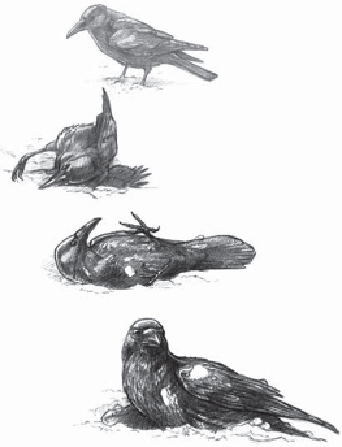Biology Reference
In-Depth Information
Q Do birds play?
A
Many mammals engage in “play,” that is, activities that enhance learning of motor
andsensoryskillsandsocialbehaviorsbutotherwiseservenoimmediatepurpose.Young
screech-owls pounce at leaves; young crows and jays pick up, inspect, and hide all kinds
of shiny objects; young gulls and terns carry small items aloft and drop them, catch them
in midair, and drop and catch them again. All these activities probably help birds acquire
theskillsandcoordinationthey'llneedforhuntingandotheressentialactivitiesasadults.
Some forms of play, called “locomotor play,” seem quite similar to the exhilarating
play of children sledding down a steep hill. Some ducks have been observed floating
through tidal rapids or fast-moving sections of rivers, and when they've reached the end,
hurrying back to the beginning to ride over and over. In the air, ravens and crows often
rise on air currents only to swoop down toward earth, then glide back upward, again and
again.
Common Ravens have been observed taking turns sliding down a snow-
bank on their tails or rolling over and over down a hill.
LEARNED VS. INSTINCTIVE BEHAVIOR
I receive many questions
about learned vs. instinctive behavior. By “instinct,” people
usuallymeaninnatebehaviors—thoseabirddoesinaparticularsituationwithoutlearn-


